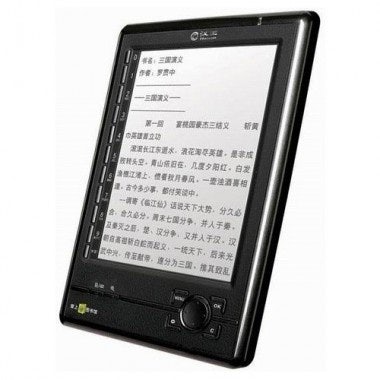Chinese Firms Benefit From Virtual Market Monopoly, Vast Population Size, Tech-Mad Urban Demographic In Mainland#

As more competitors have joined the fray in recent months, the global e-book business is finally starting to heat up, even though the technology itself has been around for a few years. Unlike that of the US, however, the Chinese e-book market remains a hectic place (at least to non-industry-insiders), where dozens of companies as large as Founder and as small as independent Shanzhai manufacturers currently ply their wares for anywhere around 1,000 RMB (roughly US $150) to upwards of 5,000 RMB and piracy -- as with most tech industries in China -- remains rife.
Still, despite the inherent difficulties of the China market, domestic companies are making inroads in their home market, and are starting to find new and innovative ways to profit not only from the sales of their e-readers but also through their deeper understanding of Chinese consumer behavior and the features and services these consumers value the most.
Today, Juliet Ye of the Wall Street Journal looks into the Chinese e-book industry, noting that -- for Chinese companies -- their market is "similar but more challenging" than in the US, Europe and Japan:
China is forecast to see e-reader sales jump from 800,000 in 2009 to three million in 2010, making up of 20% of the global market, according to a recent report by research firm DisplaySearch. The company goes on to forecast that China will surpass the U.S. to become the world's largest e-reader market before 2015, by virtue of its large population.
"It's still too early to talk about the market scale, but the China market is a highly potential one due to the large user base," said Zhang Yanan, an analyst from Beijing-based research firm Analysys International.
But the China market faces considerable challenges. Most e-readers there—manufactured mainly by local players—can get expensive for the average Chinese consumer. While bare-bones models can be had for less than 1,000 yuan (about $150), in some cases more-advanced models with handwriting recognition, card readers, WiFi access and greater access to online libraries can cost as much as 3,000 yuan.
This article brings up an interesting cultural point: even if an e-reader like the Amazon Kindle were available in China, these products would have to be heavily localized. From the basics -- like Chinese characters support, which the Kindle's U.S. version does not have -- to more specialized features beloved by Chinese readers (e.g., handwriting recognition) and few else, any e-reader manufacturer that wants to make a dent in the Chinese market has no choice but to reshape their product to the cultural particularities of China.
Ye also goes on to point out that e-readers in China are plagued by a relative dearth of online content. With publishers ostensibly terrified of putting their books online at risk of piracy, and many Chinese consumers still unaccustomed to online payment (though this has changed quickly), the actual e-book delivery system remains far less developed than in the U.S., even though the e-reader hardware is by all accounts just as good.
To address this, or possibly just as a temporary "quick-fix" until online marketplaces become more secure, some e-reader manufacturers in China are pre-loading books onto the readers or, like Founder/Apabi, making arrangements with mobile phone providers to bundle "service plans" that allow users "access to any of the 500,000 licensed titles in Apabi's proprietary content management system, including some from Penguin," as the Christian Science Monitor noted last week.
[Beijing-based Hanwang Science & Technology Co., the top e-reader manufacturer in China,] pre-installs a number of books into its e-readers, mostly classics and booklets of historical works. The company also runs its own online library, Hanwang Library, but it has only 30,000 books available for download at present. To broaden its base, Hanwang gives its e-readers the ability to support a large number of e-book formats, so users can buy books from a range of suppliers.
...
Founder Group's Apabi e-book subsidiary launched an e-book site together with search site Zhongsou.com, aiming to build world's largest online library of Chinese books. Founder's WeFound reader, at 4,800 yuan, is expensive even by Western standards, but the price includes a three-year service package with Internet access and access to its Apabi's library of 600,000 book titles, plus daily news updates.
Google google google google google Google google google google google Google google google google google Google google google google google Google google google google google Google google google google google Google google google google google